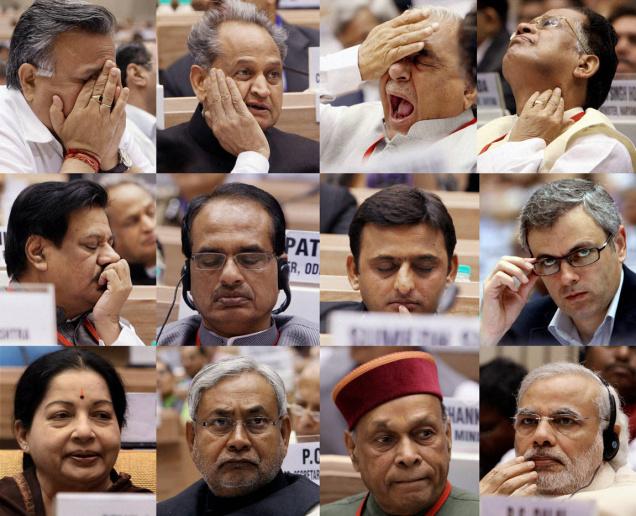
New Delhi, April 17: The Opposition-ruled States used the annual Chief Ministers' meeting on internal security on Monday to focus attention again on their objections to the Centre's proposal to set up a National Counter-Terrorism Centre, saying it violated the principle of federalism.
This was even though Prime Minister Manmohan Singh, in his opening remarks, told them that a separate meeting, scheduled for May 5, would be devoted to the subject: “We will discuss the National Counter-Terrorism Centre on May 5 at a separate meeting as some Chief Ministers have suggested.”
The government's internal security agenda included a host of issues, ranging from Left-wing extremism to Kashmir to the Northeast to terrorism, but Tamil Nadu Chief Minister Jayalalithaa ensured that the spotlight remained on the Centre-State divide.
The gathering of Chief Ministers provided her with the opportunity to hold parleys of her own at the Tamil Nadu House with her counterparts from Odisha and Gujarat, Naveen Patnaik and Narendra Modi. Punjab Deputy Chief Minister Sukhbir Singh Badal, too, was meant to join them, but was unable to make it as his speech got delayed and Ms. Jayalalithaa left for Chennai by a special flight at 4.15 p.m.
However, the three Chief Ministers did not have a joint meeting; Ms. Jayalalithaa had a one-on-one meeting, first with Mr. Patnaik and then with Mr. Modi.
‘No political forum'
Later, Rajasthan Chief Minister Ashok Gehlot, making a pointed reference to the Gujarat and Tamil Nadu Chief Ministers, said a nationally significant conference should not be converted into a “political forum.”
West Bengal's Mamata Banerjee who, like the Opposition Chief Ministers, has been waving the anti-NCTC flag, absented herself from the conference.
More assistance
But in her speech, read out by her Finance Minister Amit Mitra, she said her State could not be an “island of peace” unless the neighbouring States tackled the Maoist problem and the Centre pitched in with more assistance.
Earlier, opening the conference, the Prime Minister struck a conciliatory note: “Internal security,” he said, “is a matter in which the States and the Centre must work together, hand in hand, and in harmony.”
Effective mechanisms
Admitting that the “burden of the fight against terrorism falls largely on the States' machinery,” he stressed that the Centre was “ready to work with the States to put in place strong and effective institutional mechanisms…”







Comments
Add new comment